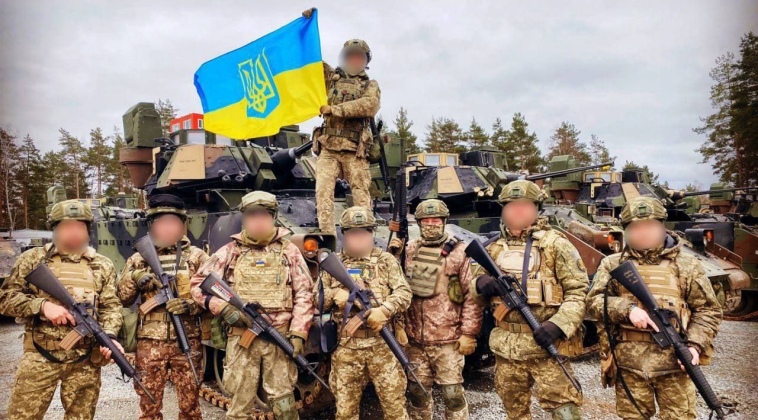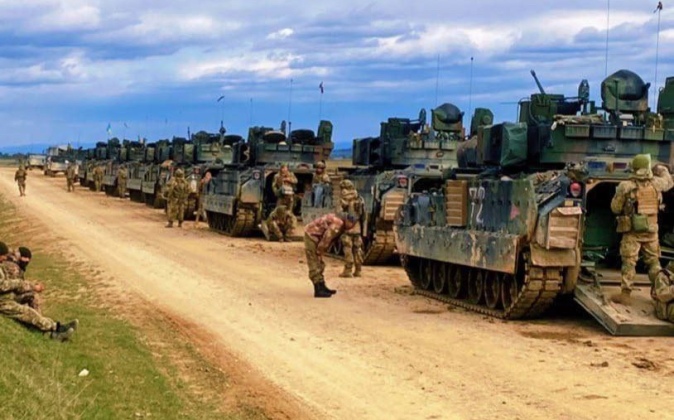News
Ukraine’s Elite 47th Mechanised Brigade Surrounded and Low on Ammunition: Critical Front Faces Collapse
The Ukrainian Army’s elite 47th Mechanised Brigade stationed in the town of Avdiivka in the disputed Donetsk region has been surrounded and forced to contend with growing ammunition shortages, according to multiple reports from Ukrainian and Western sources. British reports indicate that the brigade was meant to attack a Russian column before it linked up with assault infantry on the northern flank of Avdievka, but failed to do so due to a lack of ammunition. The brigade’s efforts to stop the advance of Russian forces in Avdievka were described by The Times as “desperate,” fuelling perceptions of an “inevitable collapse” of Ukrainian positions, and diminished hope of preventing a Russian victory by the beginning of the New Year holidays. The brigade’s elite status in the Ukrainian Army is reflected by its deployment of some of the country’s newest military equipment, with its tank battalion operating Leopard 2A6s while its mechanised infantry battalions use newly refurbished American Bradley fighting vehicles – and its 1st Self-Propelled Artillery Battalion American M109 howitzers. Leopard 2s and Bradleys have taken heavy losses since the initiation of a failed months long offensive by Ukrainian forces against Russian positions in early June, forcing many analysts to revise prior presumptions of their survivability.

A serviceman from the 47th Brigade, cited only as Sergeant Danylo, observing when interviewed over the past week “a shitty situation” as the shell shortage forced soldiers to make impossible life-and-death decisions.“We had 10 times more ammunition over summer, and better quality… American rounds come in batches of almost identical weights, which makes it easier to correct fire, with very few duds. Now we have shells from all over the world with different qualities, and we only get 15 for three days. Last week we got a batch full of duds.” Thus instead of firing on Russians as soon as they came within range, Ukrainian personnel increasingly had to wait to be sure the Russians were heading for their positions and to only engage large groups. Munitions produced by European states have very frequently been faulted for their quality, and at times been considered near useless, with Italian equipment being particularly notorious for its poor quality, in contrast to superior equipment either inherited from the Soviet era or produced in by the United States.
Sergeant Danylo elaborated regarding his brigade’s situation: “We should be controlling our sector from 4km away, so we can kill a few hundred Russian soldiers before they get to our infantry and we only take a few wounded.” “But without ammunition, we can’t. “When it’s two or three soldiers, I’m not shooting any more. Only when it’s a critical situation – say, 10 guys close to our infantry – we will work. If our rounds aren’t the same weight, the next round will fly 200m past the Russians. And then it’s too late,” he said. With munitions shortages seriously undermining the combat capabilities even of elite units, the status of conscript units that make up the large majority of the Ukrainian Army remains even more questionable. Russian forces by contrast have been increasingly well equipped, with stocks of ballistic missiles in particular showing strong signs of having grown significantly over the past 18 months facilitating intensified targeting of Ukrainian positions.

While Western and Russian sources have been increasingly unanimous that Ukraine has send large numbers of conscripts into battle with negligible training and preparation, resulting in extreme casualty rates around 80-90 percent and frontline life expectancies measured in hours, personnel from units such as the 47th Brigade are considered far more valuable by the Ukrainian state. Such units’ high far superior combat capabilities make casualties among them potentially devastating for the broader Ukrainian war effort. Russian forces were reported from December 10 to have launched a renewed assault on Avdiika, with the Ukrainian Armed Forces announcing at the time: “The enemy launched yesterday massive assault actions with the support of armoured vehicles in Avdiivka and Mariinka directions.” The status of the 47th Brigade thus has the potential to play a decisive role in the outcome of the engagements in the region, which in turn have significant implications for the wider war effort due to the territory’s strategic location. A collapse of positions around Avdiivka and of the 47th Brigade’s fighting capacity would seriously limited Kiev’s ability to continue to seriously challenge Russian control of Donetsk.












